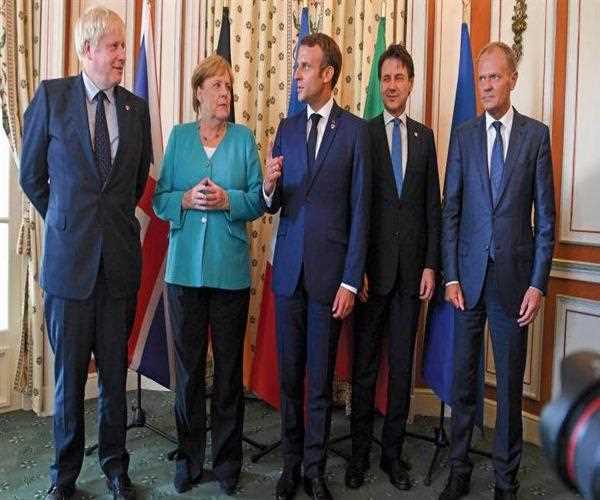Search here

18-May-2020
What Is The Right Path To Fix European Union
Members from the European Union's 28 part states assembled at the European Parliament, in Brussels, to affirm the United Kingdom's legitimate exit from the EU. After the vote was thrown, the parliamentarians from the 27 residual individuals waved their British partners farewell while singing "Days of yore," the Scottish goodbye tune that celebrates enduring fellowship and the spending from bygone eras to new. Among the leading British, some sobbed tears of distress, others tears of delight.
On the landmass, most think about the British choice to leave an unfortunate misstep. All things being equal, the Brexiteers' center dispute—that the European Economic Community they participated in 1973 has become a long way past a worldwide association of sovereign states and into something unmistakably increasingly aggressive and meddlesome—is difficult to deny. So is the case that the EU's own stumbles in taking care of the procedure of European combination had some impact in driving the British out.
On the off chance that the association needs to keep up its authenticity and worldwide impact after Brexit, it should utilize this second as a chance to correct those errors.
Most importantly, the EU should quit putting monetary rationale in front of political reality when it ought to be the opposite way round—as the first core values of European coordination held. The objective of joining, as the British student of history Alan Milward composed, was not to make a monster interior market or to in the long run become another worldwide superpower yet to save Europe's country states from the danger of breakdown, addition, and constrained occupation—dangers that numerous European states had neglected to oppose in World War II.
Those states had flopped in their essential assignment, to guard their national domain and ensure their residents. For their own endurance, European states required some level of coordination to accomplish the twin objectives of political dependability and financial flourishing. That would require some acquiescence of national power to a supranational substance, yet the fundamental target is brace the authenticity of part states.
European pioneers today ought to commit once again to that vision and build up another division of work among Brussels and national capitals. That can happen just if the most impressive residual part states—France, Germany, and Italy—arrive at an accord over what turned out badly and why. On the off chance that those states figure out how to discover shared view, Brexit could yet abandon a wounding failure into a snapshot of guarantee and restoration.
However, the new model was profoundly imperfect. Genuine organizations depend on money-related solidarity in the midst of an emergency, yet the EU neglected to set up the supranational establishments that would have made such solidarity conceivable, leaving the single market and the euro powerless against inescapable stuns. The single market empowered the free development of capital yet came up short on the common establishments to control those courses through instruments of joint money related oversight. The single money implied a typical financial strategy yet had no arrangement for basic command over monetary issues to pad the lopsided impacts of a potential emergency.
Simultaneously, the EU's attention on severe monetary and money related guidelines overshadowed its political needs, specifically the need to authorize essential fair standards and the standard of law, the two of which were to a great extent underestimated, even as an extension toward the East turned into a reality in 2004.
The achievement arrangements of the Delors time, the 1987 Single European Act and the 1992 Maastricht Treaty, profoundly adjusted European markets by revering explicit financial approach decisions in supranational understandings that could be changed distinctly by a consistent vote. Somewhat, globalization was driving comparative changes all over.
READ HERE MORE : Putin's Handling Of Coronavirus Pandemic
In any case, the EU's part states grasped the rationale of global markets with a lot more prominent excitement than any other person in the progressed modern world. What's more, in the primary decade of this century, when the EU extended to take in ten in the past socialist conditions of focal and eastern Europe, its pioneers, for the most part, stressed over how the new individuals would deal with the progress from focal intending to advertise standards. They didn't concern themselves much with the chance of vote based on losing the faith, which has since risen as the primary danger in more up to date EU individuals, for example, Hungary and Poland, and can possibly truly disintegrate the fair respectability of the whole association.
The European Commission's new president, previous German Defense Minister Ursula von der Leyen, is maybe remarkably positioned, close by Merkel, to persuade her kindred Germans of the requirement for key change. Von der Leyen has likewise guaranteed that hers will be a "geopolitical" European Commission, in a sign that Brussels is finally starting to pay attention to the requirement for an all around emphatic EU.
Presently national governments—particularly in Paris, Berlin, and Rome, yet additionally in Budapest and Warsaw—need to follow her lead. The controlling EU rule ought to indeed be the supremacy of governmental issues as opposed to financial matters—not for the wellbeing of bygone eras yet for what's to come.

Content Writer/Journalist
I am a content writter !
Join Our Newsletter
Subscribe to our newsletter to receive emails about new views posts, releases and updates.
Copyright 2010 - 2025 MindStick Software Pvt. Ltd. All Rights Reserved Privacy Policy | Terms & Conditions | Cookie Policy